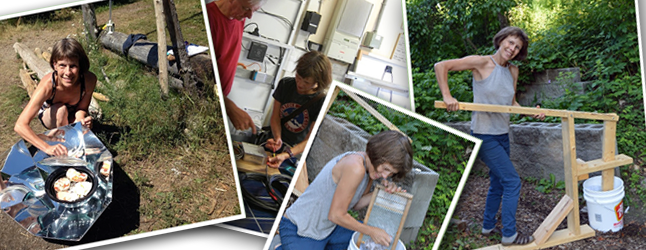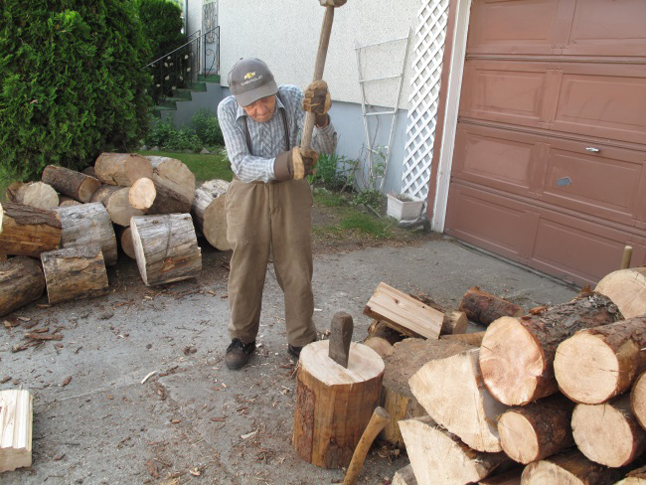
Author’s Note:
This summer I have gone off the electrical grid and am living almost fossil fuel free (I have allowed myself a fossil-fuel budget of two return car rides a month). My electricity comes from the sun, I cook with the sun and I walk or bicycle to get around. It has meant changing a lot of ingrained habits.
This series of articles discusses some of my adventures. You can also follow my blog at http://myoffthegridsummer.blogspot.ca/
By Laura Stovel
My 96-year-old neighbour, John Augustyn, has a beautiful vegetable garden. By mid-July his sunflowers and cucumber vines reach well above our heads. His trees are heavy with fruit: apples, pears and plums. Cherries, strawberries, raspberries and peas are done. Tomatoes and beans are ripening. His endives are planted in preparation for the fall and winter.
A huge stack of wood is piled neatly under the spruce tree by his driveway. Each piece stripped of bark and limbs and cut precisely 16 inches long. John’s family helps out a lot, but John does the lion’s share of splitting and stacking the wood.
John is the last remaining World War II veteran in our town and he is happy to tell stories of his many narrow escapes. Almost every day, once the ground is clear of snow, he is out in his garden, weeding, watering, planting and harvesting. He doesn’t waste anything: if a rake handle breaks or a chainsaw breaks down he tries to fix it. He uses repurposed electrical cable to tie up his plants. He moves slowly but with purpose and he gets a tremendous amount done.
By contrast, my life has felt very rushed and complicated. Juggling several jobs and volunteer activities, caring for aging parents and building and renovating several houses while trying to spend quality time with family and friends, I have found myself jumping in my car and dashing from place to place. I always seem to be carrying something heavy or just needing to make every minute count and my car has been my default form of transportation.
In Revelstoke, most places can be reached by bicycle within five or ten minutes. I have also been active for several years with the North Columbia Environmental Society, and I’m very concerned about climate change.
I know we need to curb our use of fossil fuels significantly. Why, then, did I drive every time I needed to go somewhere? If I am not cutting back on my energy use, what hope is there that others, who may be less concerned, will do what is needed to help prevent a climate disaster?
I began to look at my other habits. I often turn on lights in my house even in the daytime when I can see well without them. I turn on the computer and then leave to do other things. I leave the radio on all day, even when I’m away from home. And I use hot water much more than I need to – another default.
Food is another area of waste. In the spring I often over-plant my garden and then find I don’t have time to harvest it all – not even to give it away. My fridge is often far too full and too often I find produce that I bought on impulse, with visions of a wonderful dish that I would make, spoiling in the bottom of my crisper.
I notice that when I’m in a rush I spend more on groceries and often buy things that I already have. As a result, my cupboards are jam-packed with food.
The same situation goes with the rest of my ‘stuff.’ After my parents passed away earlier this year, I inherited their belongings and I have a lot of my own that I have collected over a lifetime: books, travel souvenirs, dishes with sentimental attachment, and stationary, art supplies and tools that just might be useful one day. The ongoing challenge of dealing with my family’s and my own possessions was taking up far too much time and energy.
When I looked at my lifestyle I could see the connection between rushing around wasting – wasting energy of all sorts, including my own physical energy. Watching my neighbour work steadily in his garden with such wonderful results, I wondered what my life would be like if I changed my habits, slowed down, and acted more deliberately.
Changing habits
My off-the-grid challenge is helping me come to terms with my habits that lead to wasted energy. Here are six that I’m working on:
Change #1: Stop turning on lights during the day
I started with the simple changes. Even before the project started I stopped turning on lights in the daytime. This was an easy habit to break. I had built my house with nice, big windows. There was no need for extra light when the curtains were open during the day. I only needed to close the curtains for privacy while changing or to shade the room from intense sunlight. There was always enough light to see comfortably.
Change #2: Stop driving and start biking and walking
This was one of my worst habits but the change has not been that hard. Once I told myself that using the car was not an option, I adapted quickly to hopping on my bike. I was driving because I thought I’d get places faster but I’m not noticing much difference. Often I’m faster on a bike because I don’t have to find a parking spot.
I do miss my car when I want to carry heavy things or go longer distances. I always have several projects on the go – like building a flagstone patio at the back of my house. I need to gather some flagstones so I’m looking at getting a bike trailer for larger loads. As I clean out my house, a trailer will also be useful for hauling things to the thrift shop or to the recycling depot.
I have given myself a budget of two car rides a month. I confess that I have borrowed one of my August rides as visitors have come through town and the meadows on our mountaintops are in full bloom. I could not resist joining friends on hikes during the peak of flower season.
Change #3: Stop being reactive, commit less and plan my days and weeks
When life becomes so busy, I often find myself running around all day and never feeling caught up. Life feels like a race with no ending. So I take short-cuts like driving and buying items because I’m not sure where they are at home. Because I’m rushed, I often forget things and have to make two trips when I could have made one. I’m pretty sure that my neighbour, John Augustyn, doesn’t do this.
This project has forced me to plan my days, putting the big and routine things first. I still juggle several contracts but have started to plan my weeks and days so that I’m working on a set project at a set time. I have also started to cut down on my volunteer commitments, doing only what suits my time and interests. This has given me more time to work on my own projects at home or just to read or relax, something I haven’t done for a while.
Because I’m cooking by the sun I need to look at the weather forecast so I can plan my meals well in advance and have a Plan B in case the sun is not out enough. This has been a change and it’s not been easy. Cooking exclusively by the sun – other than raw food – has complicated my life. I am working on finding another option.
Change #4: Focus more and turn off appliances when not in use
For this off-the-grid project I deliberately kept my energy production and storage light so I would experience the energy that I’m using, not take it for granted. With only a 250-watt solar panel and a 12-volt battery I often can’t charge my laptop and other small appliances and I always need to keep my small fridge running.
That means that I need to be very careful about the power I use. I no longer leave my laptop on to do other things. If I’m writing or working on my laptop then that’s all that I’m doing.
I have also become strategic with my appliances. I have discovered that my iPad consumes much less energy because it has fewer programs running in the background. It has become my radio (my solar radio won’t run on days like this) and my computer, where I check e-mails and compose articles before I transfer them over to my laptop. I bought a little keyboard that connects wirelessly to my iPad and that works well.
Change #5: Get into the habit of reducing possessions
My house is 916 square feet plus I have a workshop, cool room and storage room in the basement. That should be plenty for all my possessions. But over the years, I have accumulated a lot of ‘stuff’ and I inherited my parents’ belongings.
In recent months I have made good progress in getting rid of things and using things up, with the help of my family. Our thrift shop, recycling depot and RevySell, Revelstoke’s on-line list for selling things, have been wonderful resources for this effort.
After downsizing, I find that I’m spending less time looking for things. I have almost everything that I need and if I buy anything then I have a rule that I must get rid of items at least twice the size of the one I bought.
I have also given myself quotas. My mother saved almost every jar that came into the house. I have decided to save only canning jars with set lid sizes. I enjoy canning but I only need so many jars so I set myself a limit: 40 of one size; 30 of another; and 10 spice jars. That’s more than enough.
Change #6: Timing: Working with the elements
Similar to my changed habit of not turning on lights during the day, I’m trying to pay attention to the elements and time of day when I plan activities. I have long used the unheated back porch as a refrigerator in the winter and dried my laundry outside when the sun is hot. Cooking with solar heat makes me plan my meals according to the sun and I can see myself eventually moving toward a mid-day cooked meal because that’s when the sun is hottest.
Using solar energy, I seem to be able to charge my appliances better during the day, after the sun has been shining a few hours, than at night or first thing in the morning. I’m not sure why that is if my battery is not full but it seems to be the case. By paying attention to this, I can get more out of my electronic appliances.
I’m only just beginning to explore the ways we can adapt our routines to work with the elements rather than using technology to overcome the elements.
***
Almost half way into my off-the-grid summer, I’m finding that these six habits are saving me both physical and other forms of energy. My set-up isn’t ideal, but I continue to putter (I’m building myself a rocket stove and bringing in some new lights).
I think many people can identify with my experience of leading a rushed and reactive life. Perhaps some of these habits might lead to the slow and purposeful life I observe in my neighbour.
Laura Stovel is a regular contributor to The Revelstoke Current
Here are the two previous stories in this ongoing series:
My off-the-grid-summer: Solar cooking
My off-the-grid summer: Fossil-fuel free and powered by the sun



